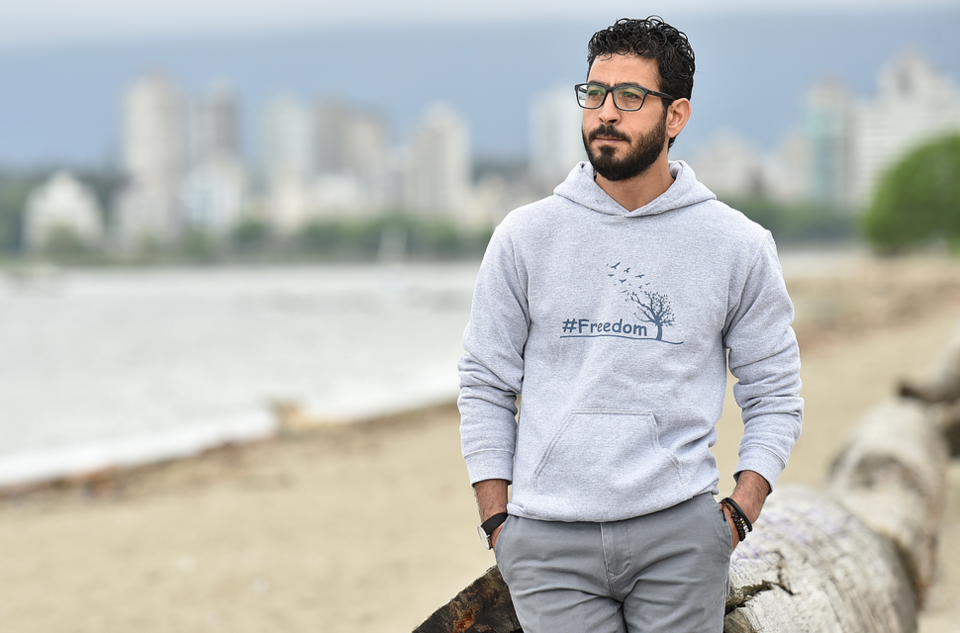Hassan Al-Kontar really wants to go fishing.
He can’t remember when he last dropped a line in the ocean, but it happened in the United Arab Emirates (UAE). Al-Kontar pulled the same kind of fish out of the water time and again that day, but it didn’t matter.
Although severe fishing restrictions in southern B.C. waters would prevent him from keeping any of the prized salmon he’s read about here, it doesn’t matter.
“Fishing is the only time I free myself from problems,” Al-Kontar says. “I clear my mind, I feel the waves and I forget everything.”
Forgetting, whether forced or not, is a constant in Al-Kontar’s life.
Sometimes the need to forget is cerebral, like when trying to erase seeing 200 lifeless bodies blown apart by an ISIS attack in his native Syria.
Al-Kontar fights the urge to forget passing by thousands of political detainees in places such as Malaysia and the UAE.
“Their faces still haunt me. ‘What happened to that guy?’ is what I think about at night,” Al-Kontar says.
Sometimes the need to forget is an act of survival.
“War is the most brutal thing humans can do to themselves — it’s the time where they change from humans to animals,” Al-Kontar says. “Not all people will heal. You choose to forget sometimes or move on. But you will never, ever heal. Sadness will always be there.”
By his own admission and the media storm that’s followed him over the last year, Al-Kontar is “the man from the airport,” and he always will be.
He took that moniker after spending close to nine months last year in Malaysia — seven in the Kuala Lumpur International Airport and two more in a detention centre. The bearer of an expired Syrian passport, Al-Kontar was unable to leave the country and, because he had overstayed his visitor visa, he was also unable to re-enter Malaysia.
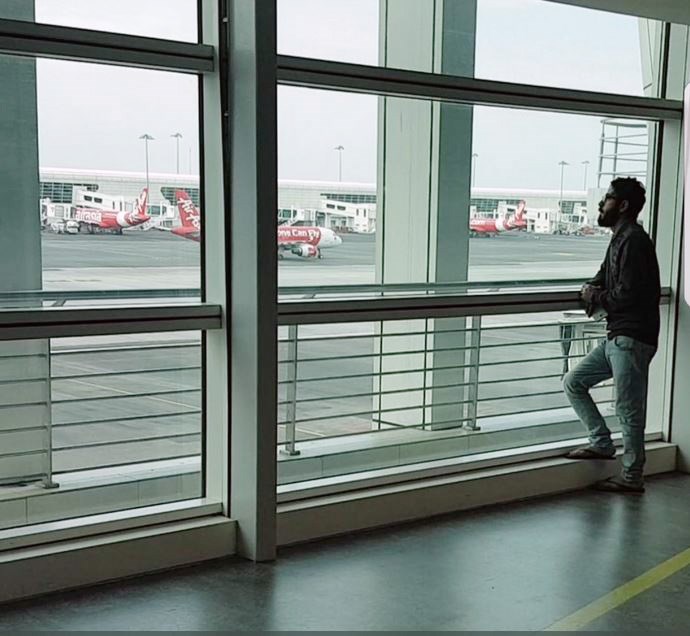
Had he returned to Syria, Al-Kontar said he would have faced compulsory military service at best, death at worst. Bureaucracy and politics made him the highest-profile persona non grata on the planet, and Al-Kontar’s story was covered by virtually every media outlet in the world.
“I will always be the man from the airport from now on,” Al-Kontar says. “Even if I forget about him, he will not forget about me.”
Al-Kontar’s path to Canada came by way of private sponsorship from Whistler resident Laurie Cooper and a group of her friends and online contacts. He arrived in the resort town late last November and moved to Vancouver in mid-May.
He spoke to the Courier exclusively days after his arrival in what was a wide-ranging discussion that touched on virtually every facet of the human experience: love, betrayal, trust, birth, death, war, renewal and hope.
Homefront
Al-Kontar was born in Dama, Syria, a small town in the country’s southwest region where his family still operates an olive farm.
His late father was an engineer, his mother a teacher. The home Al-Kontar grew up in had no electricity and his days were spent toiling in fields alongside the family patriarch.
Evenings and weekends were devoted to reading with his dad, and summers were spent learning English.
The family relocated to the much larger city of Sweida, before Al-Kontar moved to Dubai in 2006 to pursue work and opportunities that Syria couldn’t afford him. He was employed as an insurance marketing manager until his work permit expired in 2011, the same year civil war broke out in Syria. Sweida was repeatedly attacked by ISIS last year, and Al-Kontar says he’s lost close to 60 relatives in the eight-year conflict.
“[War is] when people become numbers. You will read the news and hear about the number of casualties we had today and even if they are close friends, cousins, your own blood, they will become numbers for you,” he says. “You have no more room to be sad or to grieve anyone, you will just move on.”
The Syrian embassy refused to renew Al-Kontar’s passport in 2011, and the intervening years until 2017 were spent illegally in the UAE. He was arrested that year and deported to Malaysia. Attempts to find safe haven in Ecuador and Cambodia were denied.
Left with no options, Al-Kontar took to social media to tell his story and the world listened en masse.
Al-Kontar’s home country wanted to punish him, other countries didn’t want him and time slowed down in an airport halfway across the world.
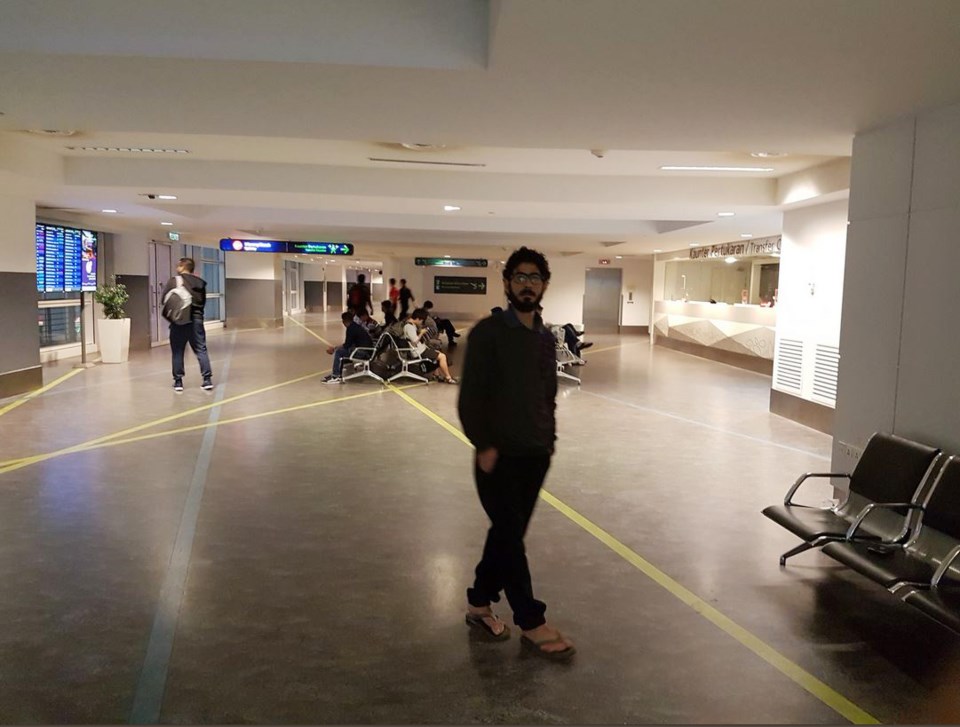
‘The hero inside’
Al-Kontar’s life in Kuala Lumpur International Airport Al-Kontar was defined by tedium and hyper vigilance. He received hundreds of offers for support from across the world and sponsorship deals from U.S. companies to endorse everything from shoes to food. Journalists hounded him.
Trust became an issue, and it still is. Ditto for survivor’s guilt.
Al-Kontar got by on handouts of food, and occasionally coffee, from airport staff. He watched his younger brother get married over Skype. As the elder male in the family, not being there for his brother’s ceremony was a low point.
Al-Kontar is asked how he coped when it seemed no hope was left.
“I found the hero inside me,” he said. “There is a hero inside each and every human. They may not know about him or her until the time they need him the most. He’s there. He’s not going anywhere, he’s not sleeping, he’s not dying, he’s just waiting for your lowest moment.”
Canadian community
If Al-Kontar’s inner hero was his sense of determination, Cooper was the hero on the outside.
She’d heard of Al-Kontar’s plight through Facebook last spring and had already volunteered twice on the Greek island of Lesbos, where thousands of Syrian migrants attempted to cross daily in 2015.
Cooper remembers seeing the lifeless body of toddler Alan Kurdi wash up on a Turkish beach four years ago. Realizing Kurdi’s aunt lived in Coquitlam, Cooper was compelled to act.
“I was living in Deep Cove at the time, and when I looked out my kitchen window I could see Coquitlam,” she recalled. “Somehow that just made me feel that this tragedy was in my backyard.”
Having moved to Whistler in 2016, Cooper caught the ear of Fairmont Chateau Whistler staff who heard about her plans to privately sponsor refugees and jobs were offered. Toronto-based lawyer Andrew Brouwer heard Cooper interviewed on the CBC and went to work behind the scenes with immigration officials and Amnesty International.
The B.C. Muslim Association and an anonymous U.S. donor helped raise the money necessary to support Al-Kontar for a year, while Cooper and others took care of clothing, food and room and board.
All the while, Cooper and Al-Kontar communicated via Facebook Messenger and Whatsapp exclusively as his profile gained traction across the world.
Of the hundreds of offers for help, Cooper’s was the only one he trusted. She vetted him for personal information and dates and both parties said, and did what they promised.
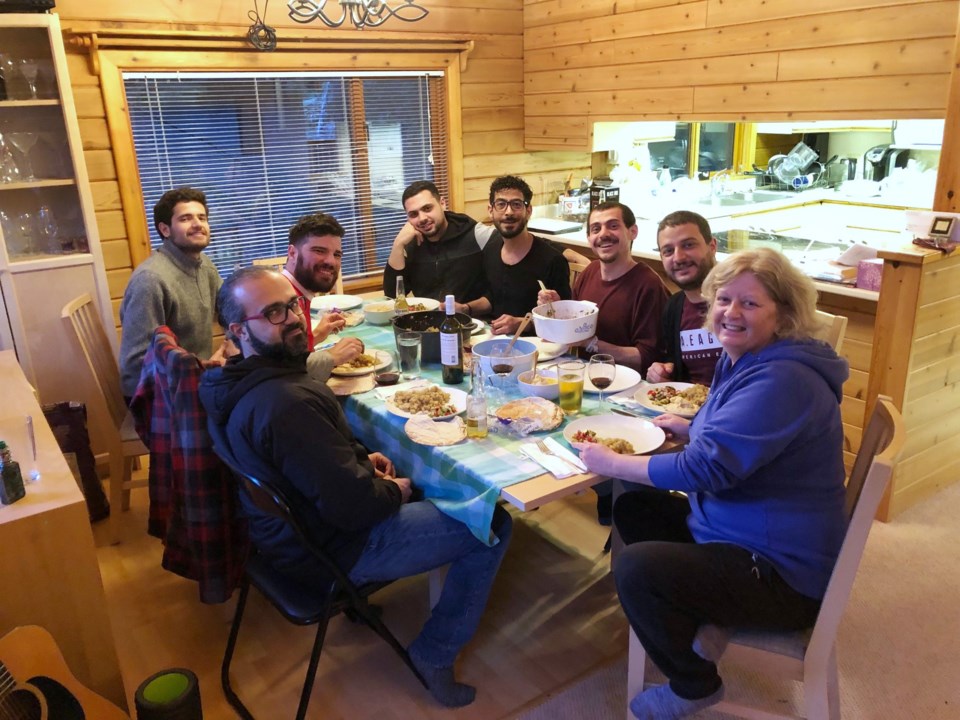
Al-Kontar arrived at YVR during the late evening hours of Nov. 27, 2018.
It was raining and dark, and Al-Kontar couldn’t see the ocean, mountains or the sky, but it didn’t matter.
“I absolutely felt like my son had come home,” Cooper recalled. “I felt like we’d always known each other and that he was just coming home.”
Skiing, snowboarding and coffee were Al-Kontar’s creature comforts upon arriving in Whistler. Cooper said he was immediately welcomed by everyone in the community. Al-Kontar was restless in those early days and barely slept, likely a reactionary effect of always being on guard at the airport.
Those reactions are hard to shake, and Al-Kontar admits that trust is still a difficult concept.
“People like me who live on the edge of risk, it surrounds you so it’s hard to trust a situation. We have an idea about life that life is unfair and there’s no justice and you need to make your own destiny,” he says. “All I was asking for was a permanent solution, a permanent safe place, a place to work, live and secure myself. And all of a sudden I get the full bag once I landed, so it was a lot to take.”
Al-Kontar now lives in a basement suite in Kits. He wants a future in refugee settlement or public speaking, something he does a lot of now, though it doesn’t pay the bills.
There was no drama leaving Whistler — it was just time to go to the big city to pursue bigger things. It was a plan many months in the making. Cooper is working on bringing three other refugees from the Middle East to Canada, which would up her compassion tally to 12.
“I miss him horribly but as a mother I know there’s a point where you have to spread your wings and fly,” Cooper said. “He needed some time to just be quiet and figure out his path.”
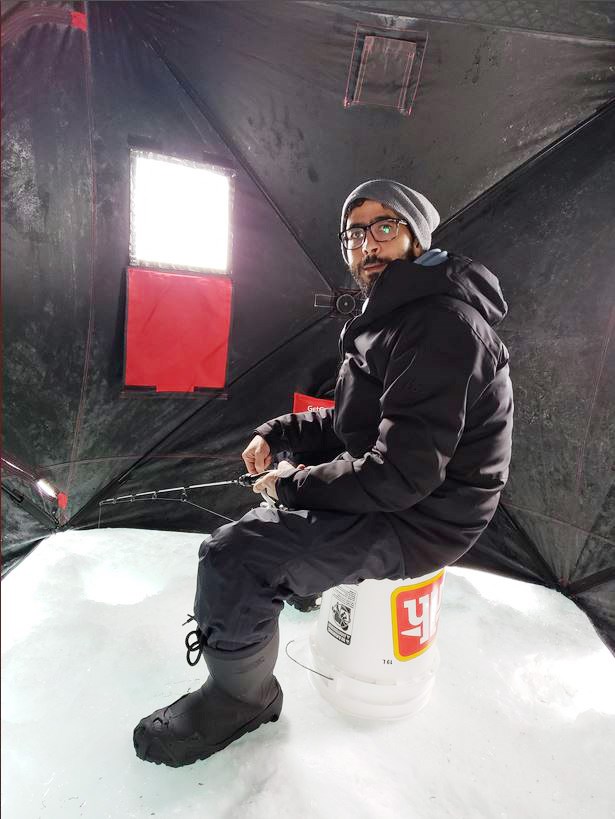
‘This is priceless’
Al-Kontar’s way forward isn’t black and white.
Anger is always there, Al-Kontar admits. “[But] I train myself to control it because I can’t change life.”
Another thing that’s changed is Al-Kontar’s religious affiliation. Previous coverage of his story identified him as belonging to the Druze religious minority. The Courier asks him specifically about his thoughts on God and spirituality in light of what life has handed him.
He believes in Liberalism, and explains its tenets like this:
“Since time has started, there was God, there was killing and people killing in His name. If He’s approving that kind of killing, I’m an atheist. If He’s not, and I think He’s not, it doesn’t matter which religion you have because religion is only a path, knowing God is the goal. Absolute love, peace and justice — that’s God.”
Al-Kontar has never been in love with a woman. He’s an introvert and admits that relationships elude him, whether it’s for love or friendship. Despite that, he sees himself married and a published author within a decade.
In the meantime, the ocean is calling. Al-Kontar would like to see a whale for the first time.
Maybe he’ll catch a salmon — but it doesn’t matter.
“Canada is a feeling, it’s an idea, it’s a value and it’s a reference,” he says. “It’s feeling of being permanently safe, having dignity and human rights. This is priceless. Coming from a place with no human rights or any kind of dignity, that’s priceless.”
@JohnKurucz
